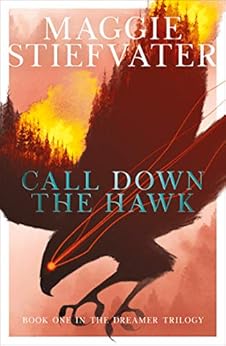For you, reality is not an external condition. For you, reality is a decision. [loc. 746]
I greatly enjoyed Maggie Stiefvater's Raven Cycle (The Raven Boys, The Dream Thieves, Blue Lily, Lily Blue and The Raven King -- so how did I miss that a new trilogy, focusing on the Lynch brothers, has been promised for years and that the first volume came out months ago?
Call Down the Hawk has a very different ambience: darker, more dangerous, less mythic -- which is not to say that it lacks the fantastic, for that's an essential part of the story. Ronan Lynch (my favourite of the Raven Boys) can dream things into existence: this is both a blessing and a curse. He is separated from his boyfriend Adam because he's become less able to control his dreams, and because Harvard would rather nobody dreamt murder crabs and motorcycles in their dorm rooms. Gansey and Blue have headed off on a road trip: Noah, of course, is gone. Ronan is left to moulder at the Barns, the rambling house where he grew up, and to wonder why black nastiness -- 'nightwash' -- oozes from his eyes and nose when he doesn't dream enough.
Jordan Hennessy is a forger par excellence, who can reproduce any painting, any signature. It's not just art that she can copy, though. She and the girls she lives with exist in an uneasy equilibrium of created and creator.
Carmen Farooq-Lane, recruited to a secret international taskforce known as the Moderators, works with Visionaries (who all share a vision of a world in flames) to locate and neutralise Zeds, one of whom will some day dream that apocalyptic flame into existence.
There are a lot of stories woven into Call Down the Hawk. Declan, Ronan's deliberately dull elder brother, turns out not to be so dull after all: Matthew, the youngest of the Lynch brothers, is starting to grow up: and the lady in a long-sought painting may not be Ronan's mother after all. There are shadows of other players in this dangerous game: the Boudicca organisation, the new Fenian ...
At the heart of the novel, though, are characters who are trapped by their abilities, or their natures, without truly understanding them. Adam may be moving on: Ronan can't. Jordan wants independence, but her nature prohibits it. Carmen is beginning to question the work she does, and perhaps her latest Visionary will provoke more questions.
This is a far darker, bleaker story than the preceding quartet. I missed the women of Fox Way, and their cheery witchery. (If there's a specific lack in this novel, it's older characters: almost everyone's in their teens or twenties.) It took me a while to attune to the ambience, to start to like this grimmer Ronan, to appreciate Hennessy's art and Declan's control and Carmen's icy facade (and right hook). But it was worth persevering, and now I'm eager for the next in the trilogy.
[Note: I don't think it's necessary to have read the quartet before starting this, but there are some references that will make more sense if you're familiar with what's gone before.]

No comments:
Post a Comment